South Africans who have the most to offer are the very ones the country is most likely to lose to emigration, according to new research.
Polling by the Social Research Foundation (SRF) suggests that more than half of South Africa’s university graduates, and nearly half of the country’s upper income earners are considering emigration.
In its eighth report of the year, under the plain title, ‘Share of registered voters considering emigration’, the SRF presents the bald truth of it in just 44 words: ‘The upshot of the data is that South Africa is vulnerable to surrendering near half of its top skills base and income earners, and by extension much of its remaining tax base, in the event of these individuals securing employment and business opportunities overseas.’
The survey sought to investigate ‘what share of registered voters in South Africa are considering emigration’. The results are then broken down by highest level of education, rural or urban status, political party affiliation, age, and income level.
The SRF notes that while the data was collected from registered voters ‘it can with a degree of confidence be extrapolated to the broader adult population of South Africa’.
The implications are significant for the steadily narrowing stratum of middle class taxpayers who have long shouldered the burden of being the main personal income tax contributors to the national kitty, and on whom pressure to pay more continues to rise.
The implications are no less significant for the steadily swelling stratum of poor, jobless people who are dependent on the state – but who are reliant, ultimately, on taxpayers.
For Frans Cronje – the former IRR CEO who now directs advisory firm Frans Cronje Private Clients and is a director of the SRF – the meaning in the findings is simply stated: ‘What the data shows is that South Africa is vulnerable to losing the skills and tax revenues necessary to support a post-ANC economic recovery.’
Anecdotally, everybody knows of someone upping sticks and leaving for good, and news reports point to the gathering pace of emigration.
Bloomberg reported last week: ‘Confidence in South Africa’s future has fallen after more than a decade when average economic growth failed to match the increase in population, meaning the country’s citizens have been getting poorer. The country has been afflicted by corruption scandals in recent years and regular power outages since 2014. More than 350 people died in a spate of looting and arson in July 2021.’
BusinessTech reported in July: ‘Financial services firm FNB published its latest property barometer highlighting the key reasons why South Africans are selling their homes right now.
‘The group’s data shows that 8% of home sales across the country right now are emigration-related. However, this ratio increases to around 15% in the R2.6 million-R3.6 million price band and the over-R3.6 million segments.’
Biznews reported in June: ‘Safety concerns, rolling blackouts, corruption, and economic stagnation are just some of the motives behind high-net-worth individuals (HNWIs) choosing to leave for overseas.’
City Press reported in April: ‘Economic, social, political and environmental concerns may have led to nearly 1 million South Africans leaving the country between 2015 and 2020.
‘According to the UN Department of Economic and Social Affairs (Desa), 914 901 South African citizens emigrated between 2015 and 2020.
‘Compared with the period between 2010 and 2015, when 786 554 locals left the country, the latest emigration data point to increasing numbers of people departing our shores.’
BusinessTech reported in February: ‘Personal Income Tax (PIT) collection, the largest source of tax revenue in South Africa, has fallen in recent years, says EY chief economist Angelika Goliger.
‘Between 2003 and 2012, the number of PIT taxpayers grew by 7%. Since 2012, however, some of these gains have been eroded with a -2.1% decline in the number of taxpayers, according to data from SARS.
‘This is particularly worrying as there were only 5.2 million individual taxpayers in 2020, Goliger said. “These 5.2 million individuals, representing approximately 9% of the population, contribute 40% of South Africa’s total tax revenue. Breaking it down further, about 20% of individual taxpayers contributed to three-quarters of personal income tax revenue in 2020.”’
Goliger ascribed the declining tax take first to a weakening of the economy, and, second, to ‘the decline in individual taxpayers [as a result of ] the emigration of skilled South Africans abroad. The UK, Australia and the Netherlands, for example, have all registered strong growth in the number of South African immigrants in recent years’.
The SRF data underscores this last point; what’s especially significant about emigration sentiment is which categories of people most want to go.
When asked ‘Are you considering emigrating?’, 23.4% said yes, against 76.1% who said no.
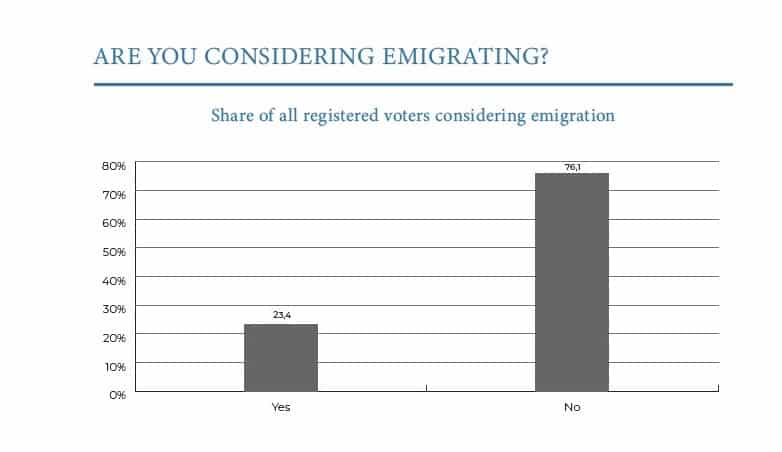
That is significant enough: the first of the report’s ‘tentative conclusions’ being that ‘just under a quarter of all registered voters, and by extrapolation likely adult South Africans, are considering emigration’.
‘This figure rises,’ it goes on, ‘with social and economic status’.
‘Among university graduates, for example, over half of respondents indicate that they are considering emigration, while near half of upper income earners indicate the same.’
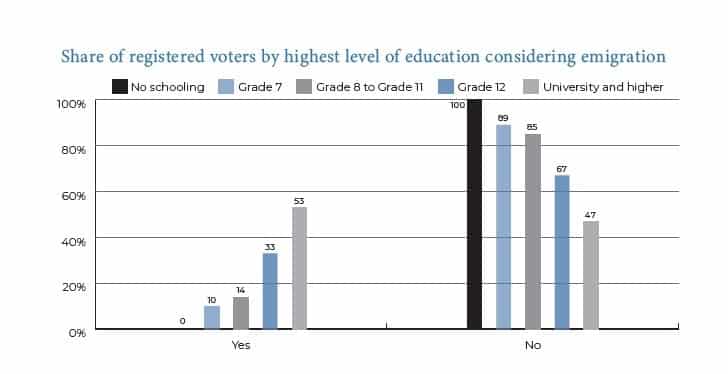
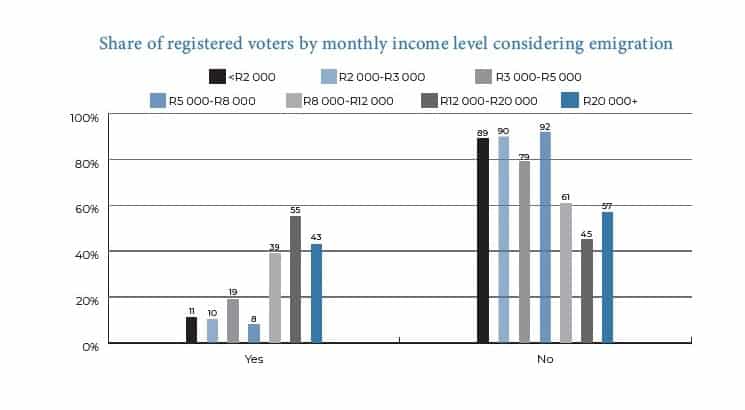
Older South Africans are more likely to want to stay put, but not so younger people, who still have their most productive years ahead of them.
‘People between the ages of 25 and 40 are the most likely age groups to be considering emigration.’
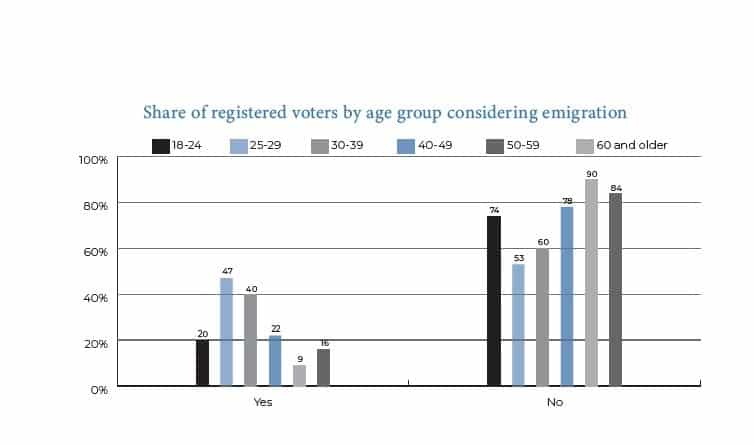
Rural people are more likely to want to remain – but this is not true of urban people who likely have higher expectations, and greater aspirations.
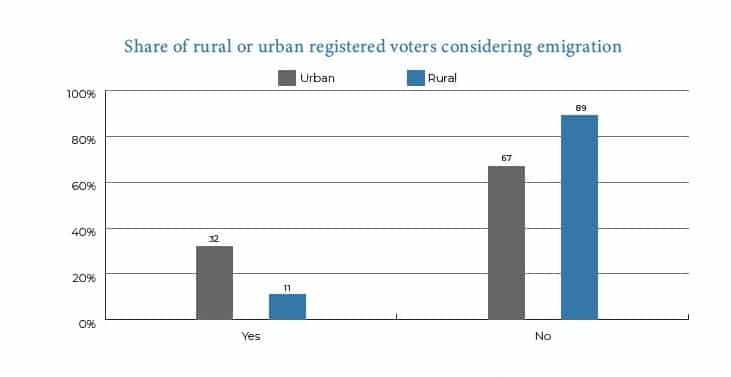
The data, the report notes soberly, ‘is consistent with the Foundation’s past findings on confidence in South Africa’s future.’ It adds: ‘Just 2 in 10 ANC voters are considering emigration whilst just over 3 in 10 EFF and DA voters and near half of FF+ and ASA voters are.’
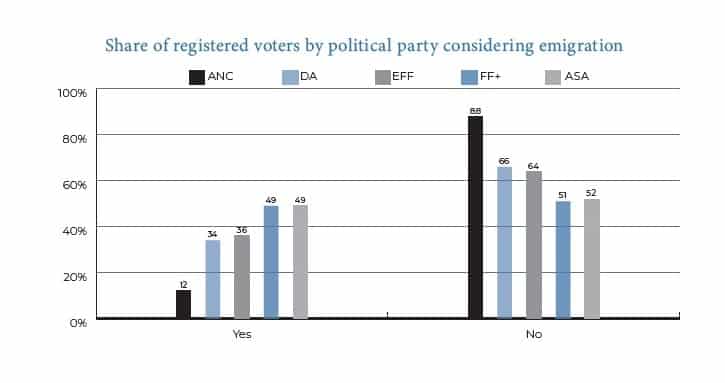
For the record, the data in the report is based on a survey commissioned by the SRF in July. The survey was conducted telephonically among a sample of 3 204 randomly selected and demographically and regionally representative registered voters and has an overall margin of error of 1.7%. Figures may not add up to 100% as respondents who failed to provide answers were excluded from the charts featured above.
[Image: Josep Monter Martinez from Pixabay]
If you like what you have just read, support the Daily Friend

